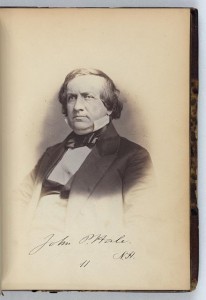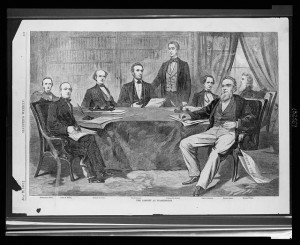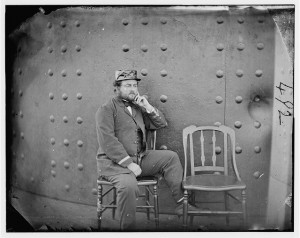According to this report, an Albany, New York newspaper thinks the Confederacy is doing as well as it is in the rebellion because its government is non-partisan and set up on a war footing. The Lincoln administration, on the other hand, is preoccupied with partisan politics and the spoils system.
From the Richmond Daily Dispatch September 20, 1862:
The contrast.
[From the Albany (N. Y.) Atlas.]
At a public meeting in New Hampshire, Senator Hale of that State is reported to have said: “I may be ordered to Fort Warren for the expression I am about to make, but I do not hesitate to declare that there is nothing that can parallel the exhibition of ability, vigor and resource shown by the Confederate Government, except the incapacity and imbecility of our own.”
Senator Hale has not yet been sent to Fort Warren, and will not be. That place is reserved for Democrats, who, at some former day, may have offended a Cabinet officer, and who are badgered with false charges of disloyalty now.
What is the secret of the contrast between rebel efficiency and governmental helplessness? When the Confederate Government was organized, the opposition was at once associated in the administration. Stephens, who ran with Douglas, was made Vice President. A Cabinet of all parties was constructed. When Cabinet officers were proved insufficient, they were dismissed. Laggart Generals were cashiered, deserters shot, peculators punished. The South was organized on a war basis.
President Lincoln, on the other hand, made up his Cabinet out of the dead-wood of the Chicago Convention. Seward, Chase, Cameron, Bates, were all his rivals, and enemies of each other — all disappointed and rejected men! These worn-out politicians had their followers to provide for; and they fed them upon the plunder of the treasury — upon the commissariat of the army — upon the spoils of patronage. In the crisis the first battle of Bull Run, the President was engaged in settling paltry claims of partisans to post-offices; and, fourteen months later, when Washington was in hourly danger of capture, was busy making up partisan lists of Tax Collectors, and Assessors — selecting them upon occasion from the exposed and condemned shoddy contractors.
One Army, at a conjuncture when the fortunes of the whole contest were depending upon it, has been sacrificed to political jealousies. Another General whose name has always been associated with defeat has been kept in command by the Nepotism of Cabinet ministers! All the while the energies of the Government have been directed against the press, or the free discussion of citizens, or to seconding the private revenges and political hates of men who have secretly instigated accusations against their neighbors. Never on so great an occasion had an administration confined itself to such paltry objects!
But did not Mr. Lincoln preface his inaugural oath by the declaration that he considered the decision of the Supreme Court, in regard to the subject of slavery, as not binding upon him; while he felt bound to obey the instructions of the Chicago platform? A stream never rises higher than its fountain; nor an administration, than its head.
All this while the people have placed in the hands of the President, at Washington, unlimited resources of men and money, arms, ships, and public credit.
It is customary to say in excuse for the present state of affairs that the Confederacy has exhibited unexpected resources. True; but has not the North shown a power and wealth of means equally surprising? We have raised armies such as Europe never equalled; navies which have never been surpassed in extent or in the use of modern improvements of warfare. We have spent money at a rate that startles the most extravagant schemers of the Old World. There is not an invention of war.–plated ship, mammoth gun, marine ram, ærial [aerial?] telegraph, balloon of reconnaissance, diving ball, or pontoon — which we have not had. No army ever marched, no navy ever sailed with such pay or provision or armament as ours.
We stood as immeasurably above our adversaries in resources on the last day’s battle at Bull Run as a year ago. We are now as far above them as at any time, if we had men in charge of public affairs capable of handling there resources. There, and there alone, the contrast lies between ourselves and our adversaries.
John Parker Hale was the nominee of the Free Soil party in 1852 and later became a Republican. President Lincoln appointed Mr. Hale as minister to Spain in 1865.



